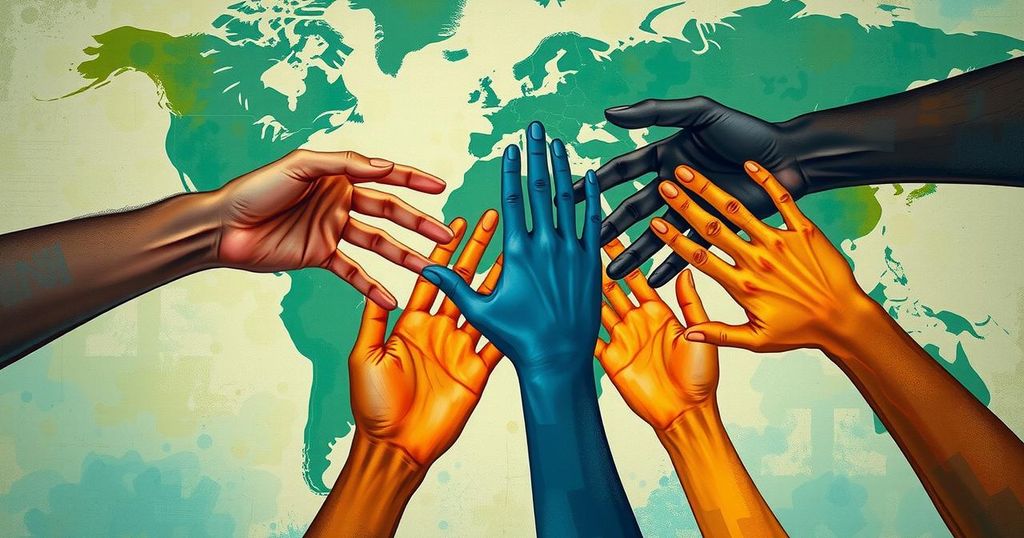Global news
AFRICA, ASIA, HUMAN RIGHTS VIOLATIONS, HUMAN RIGHTS WATCH, HUMANITARIAN CRISIS, ICJ, INTERNATIONAL COURT OF JUSTICE, INTERNATIONAL LAW, OMAR AL - BASHIR, RAOUL WALLENBERG CENTRE FOR HUMAN RIGHTS, SEXUAL VIOLENCE, SUDAN, UAE, UNITED ARAB EMIRATES, WAR CRIMES, WEST DARFUR, YALE UNIVERSITY
Isaac Bennett
0 Comments
The Global South Must Uphold Sudan’s ICJ Case Against the UAE
Sudan has filed a case against the UAE at the International Court of Justice, accusing it of complicity in genocide through support of the Rapid Support Forces. The charges stem from the RSF’s violent conflict against the Sudanese Armed Forces and documented atrocities against the Masalit ethnic group. The case highlights the implications of international law and the necessity for cooperation from the Global South to uphold justice principles amid a shifting geopolitical landscape.
On March 6, 2023, the International Court of Justice (ICJ) disclosed that Sudan had filed a case against the United Arab Emirates (UAE), alleging its involvement in genocide through support for the Rapid Support Forces (RSF). This support has contributed to a violent struggle for power against the Sudanese Armed Forces (SAF), sparking serious humanitarian concerns. Sudan holds the UAE accountable for egregious human rights violations, claiming it has aided war crimes since the onset of hostilities in April 2023.
The case cites horrific atrocities committed by the RSF against the Masalit ethnic group. Reports indicate that from May to June 2023, approximately 15,000 civilians were killed in West Darfur, and over half a million individuals were displaced into Chad. This tragic situation mirrors the earlier Darfur conflict, which witnessed similar atrocities perpetrated by militias connected to the previous Sudanese regime.
Sudan argues that the UAE’s actions breach the Genocide Convention by facilitating the RSF’s genocidal campaign. The evidence presented includes forensic accounts as well as two reports: one from the Raoul Wallenberg Centre for Human Rights and another from Human Rights Watch, which document systematic violence, sexual assaults, and wide-scale destruction of villages in West Darfur, corroborated by satellite imagery from Yale’s Humanitarian Research Lab.
The United Nations has corroborated the existence of mass graves following RSF assaults, with survivor testimonies revealing that RSF fighters explicitly targeted the Masalit people based on their ethnicity. This pattern of attacks demonstrates a clear intent to commit genocide, reflected in the U.S. State Department’s classification of RSF activities as genocidal, despite the belated nature of this designation under the current administration.
The acknowledgment of the UAE’s role is substantiated through meticulous documentation. The U.N. Security Council’s Panel of Experts highlighted credible evidence of the UAE’s provision of arms to the RSF from its base in Chad. Analysis by the Conflict Observatory confirmed extensive arms transfers, with numerous flights from the UAE to the conflict region, raising concerns about the military resources fueling the conflict.
Reports from credible sources, including The New York Times, have further revealed the existence of a concealed Emirati drone base that provided operational support to the RSF, emphasizing a coordinated military effort that exacerbated civilian suffering.
The UAE’s significant economic and diplomatic strength poses a challenge, given its affluent economy and strategic alliances with Western nations. The recent political maneuvering by U.S. lawmakers indicates a troubling pattern where the UAE has allegedly reneged on ceasefire commitments, allowing the RSF to continue its violent campaign.
In the face of a deteriorating international justice framework, exemplified by recent U.S. sanctions against the International Criminal Court, Sudan’s case could serve as a litmus test for global legal accountability. The solidarity previously shown towards South Africa’s ICJ case against Israel for genocide in Gaza underscores the need for consistent support among nations of the Global South.
While Sudan’s ongoing crisis lacks the high-profile historical context of South Africa’s struggle, it underscores the grievous burdens faced by postcolonial states and their exploitation. The escalating humanitarian catastrophe not only highlights local suffering but also reveals systemic neglect by the international community, further exacerbated by external influences.
Nations that previously supported South Africa must not neglect Sudan; failure to act could weaken the principles of solidarity and equitable application of international law, potentially sidelining critical humanitarian issues. It is crucial to distinguish support for Sudan’s case from an endorsement of the SAF, acknowledging the complex realities of civilian suffering caused by both forces involved in the conflict.
Support for Sudan’s legal action must stem from a commitment to principle, focusing on the UAE’s accountability for actions that destabilize regions and exploit conflicts for gain. The implications of this case for international law enforcement and justice are profound, representing a critical threshold for re-establishing the ICJ’s integrity and authority in holding powerful states accountable.
The UAE may invoke its Article IX reservations to avoid jurisdiction under the Genocide Convention, but legal experts argue that such reservations undermine accountability. Sustained support for Sudan in the ICJ will demonstrate a commitment to justice and a rejection of impunity that allows powerful nations to operate above the law.
Ultimately, if countries of the Global South continue to neglect Sudan’s grievances, they risk establishing a precedent where political power supersedes justice, leaving vulnerable states and their peoples as mere pawns in geopolitical maneuvers.
Amgad Fareid Eltayeb served as former assistant chief of staff to Sudanese Prime Minister Abdalla Hamdok from January 2020 to February 2021.
In conclusion, Sudan’s case against the UAE in the International Court of Justice represents a significant opportunity for the Global South to demonstrate solidarity against alleged violations of international law. The evidence of complicity in genocide cannot be overlooked, as supporting this case may reinforce the integrity of the international legal framework. Failure to act would not only compromise the principles of global justice but also perpetuate a systemic hierarchy that disadvantages postcolonial nations. Hence, it is imperative for nations to uphold accountability, ensuring that powerful states cannot evade responsibility for their actions.
Original Source: foreignpolicy.com




Post Comment